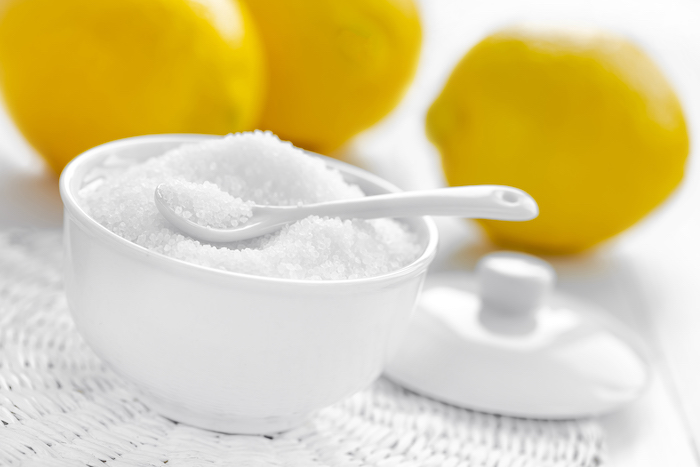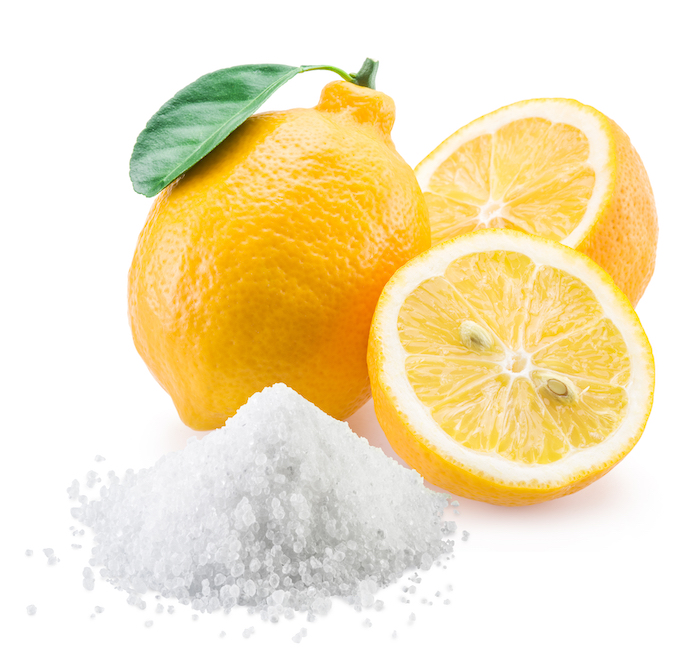Skim the ingredient list of many beverages, jams, canned vegetables, or frozen foods and you’re likely to come across one that you can actually pronounce — citric acid.
Despite its prevalence, few consumers know what it is or where it comes from. (Though that first word should give you a clue…)
Here’s what you should know about citric acid, including its origins, uses, and benefits.
What Is Citric Acid?

Citric acid is an edible acid naturally found in citrus fruits, and it’s what gives them their sour taste.
It’s also commercially manufactured for a wide variety of uses in processed foods and beverages, cleaning products, pharmaceuticals, nutritional supplements, and cosmetics.
While lemons and limes may be more commonly known for their ascorbic acid (AKA vitamin C) content, citrus fruits actually contain more citric acid. In fact, citric acid can account for as much as 8 percent of the total dry mass of a lime or lemon!
The initial discovery of citric acid is credited to eighth-century Persian alchemist Jabir Ibn Hayyan. But it wasn’t until the late 1700s when Swedish chemist Carl Wilhelm Scheele first isolated citric acid from lemon juice.
Over the next century, citric acid became widely used in a variety of food, cleaning, and cosmetic products as a preservative, flavor-enhancer, and stabilizer.
In the 1900s, American food chemist James Currie found that a common fungus that causes black mold on fruits and vegetables, Aspergillus niger, produces large amounts of citric acid when fed a sugar solution.
This synthetic means of deriving citric acid revolutionized the market and became the new standard for its industrial production.
Citric Acid Uses in Food

“It’s used in food and beverages to boost acidity, enhance flavor, and preserve ingredients,” explains Amy Goodson, MS, RD, CSSD, LD, a board-certified specialist in sports dietetics. “It can also be added to canned fruits and vegetables to protect against botulism, a rare but serious illness caused by bacteria.”
Citric acid is one of the most common food additives in the world because of the variety of uses and benefits it offers, Goodson adds.
Here are just a few citric acid’s applications:
Citric Acid Benefits

While citric acid offers a range of benefits for food and beverage manufacturers, Goodson explains that dietary citric acid can also provide a number of health benefits for consumers as well.
1. Antioxidant properties
Some research has shown that citric acid may benefit antioxidant activity.
Antioxidants are substances found in foods like fruits and vegetables that may prevent or delay certain types oxidative stress that can cause cell damage. Citric acid is associated with antioxidant benefits for helping to support the immune system as well as liver and brain function.
2. Mineral absorption
Citric acid can help your body retain some key minerals. “Citric acid enhances the bioavailability of certain minerals, helping your body to better absorb them,” explains Goodson.
Studies have supported a link between citric acid and mineral absorption, calcium and phosphorus, in particular.
3. Reduce physical fatigue
While more research is needed to understand its connection to physical fatigue, citric acid may also benefit energy levels.
A small human study reported in the Journal of Clinical Biochemistry and Nutrition found that oral consumption of citric acid helped reduce physiological stress and fatigue in the body after hard workouts.
While the reasons for this phenomenon aren’t fully understood, it’s theorized that it may have something to do with the cycle of energy production in which citric acid is a primary player.
Is Citric Acid Bad for You?
Concerned that citric acid might be bad for you?
While 99 percent of the world’s production of citric acid is now manufactured instead of derived from lemons, there is little evidence that citric acid — even the synthetic stuff — has health risks for consumers, says Goodson.
“Manufactured citric acid is generally recognized as safe (GRAS) by the Food and Drug Administration (FDA). So consumers can feel safe consuming it as a part of food and beverages,” Goodson explains.
